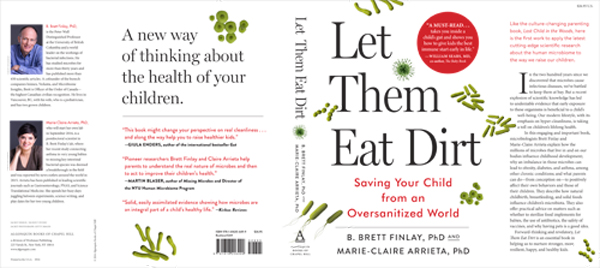It’s been a mantra for generations: cleanliness is next to godliness. Kids are urged to wash up before dinner, and a bottle of hand sanitizer on the desk is de rigueur for elementary-school teachers. But could all this hygiene actually be harming children?

Let them Eat Dirt, UBC microbiologists Brett Finlay and Marie-Claire Arrieta
In their new book, Let Them Eat Dirt, due out September 10, UBC microbiologists Brett Finlay and Marie-Claire Arrieta outline the latest research into the role bacteria play in growing bodies, and offer tips on how parents can ensure their kids get exposed to plenty of healthy bugs. Here, Finlay outlines why dirt can be a child’s best friend.

Dr. Brett Finlay
What does current research tell us about the link between bacteria and human health?
In the past, scientists knew we had microbes in and on our bodies, but we really had no clue whether they did anything. You can’t grow them outside the human body, so we didn’t have the tools to study them. Genome sequencing has allowed us to determine what microbes are there without needing to grow them.
Today, there is a major groundswell realization that bacteria play many roles in health and disease, starting in utero. The first 100 days of an infant’s life are a critical time period for setting up the body with its microbes. Allergies, asthma and many other western diseases occur more frequently in kids who are born by C-section, bottle-fed babies and children who receive antibiotics early in life.
Microbes are now associated with obesity, diabetes, abnormal brain development, inflammatory bowel diseases, depression, possibly autism and more. The joke in the field nowadays is what is NOT affected by microbes. It is really a fundamental shift in how we think about human biology.
Is the book’s title meant literally? Should kids actually eat dirt?
Of course not. We wanted to get the concept across that kids should be kids, and we should let them play in the dirt and be exposed to microbes. We live in a hyper-sanitized world, and we recognize that hygiene has been great for decreasing infectious diseases. But we also now realize that this has unintended consequences. We need to try and repopulate the body with diverse microbes, as that is how we have evolved as a species.
What simple lifestyle changes can encourage healthy bacteria?
Allow your kids to be exposed to nature under safe conditions. Don’t wash their hands every few minutes. Let them play outside. Get a dog. Avoid unnecessary antibiotics. Take probiotics for certain things. And, importantly, eat a diet that encourages microbes—this means fiber, complex carbohydrates, nuts and fermented foods, NOT white sugar and flour.
For years, parents have been telling kids to wash their hands before dinner, and every classroom has a bottle of hand sanitizer. Is there still a place for hand soap and sanitizer?
Within reason, yes. Washing with soap and water is the best hygiene mechanism we know, and it certainly has its place. Hand sanitizer should only be used if there isn’t a source of clean running water and soap. But you don’t have to wash every time a speck of dirt comes their way.
Video: Gut bacteria and asthma